
miami-dade recycling schedule 2023 pdf
The 2023 Miami-Dade Recycling Schedule is a comprehensive guide for residents, detailing collection days, accepted materials, and holiday adjustments to promote efficient recycling practices countywide․
Overview of the Importance of Recycling in Miami-Dade County
Recycling plays a vital role in preserving Miami-Dade County’s environment by reducing landfill use and conserving natural resources․ It helps decrease greenhouse gas emissions, contributing to climate change mitigation․ By participating in recycling programs, residents support sustainability efforts and promote a cleaner community․ Recycling also fosters economic benefits by creating jobs in the recycling sector and reducing waste management costs․ The county’s commitment to recycling aligns with broader environmental goals, encouraging residents to take an active role in protecting their surroundings․ Through education and accessible programs, Miami-Dade County aims to build a culture of sustainability for future generations․
Key Features of the 2023 Recycling Schedule
The 2023 Miami-Dade Recycling Schedule offers a detailed guide for residents, outlining specific collection days and times for recyclables․ It includes a full list of accepted materials, ensuring clarity on what can and cannot be recycled․ Holiday adjustments are clearly marked, preventing disruptions in service․ The schedule also provides information on bulky waste pickup and household hazardous waste disposal, making it a one-stop resource for waste management needs․ Available in multiple languages, the schedule ensures accessibility for all residents․ Its user-friendly format, including printable PDF versions, helps residents stay organized and committed to recycling efforts throughout the year․
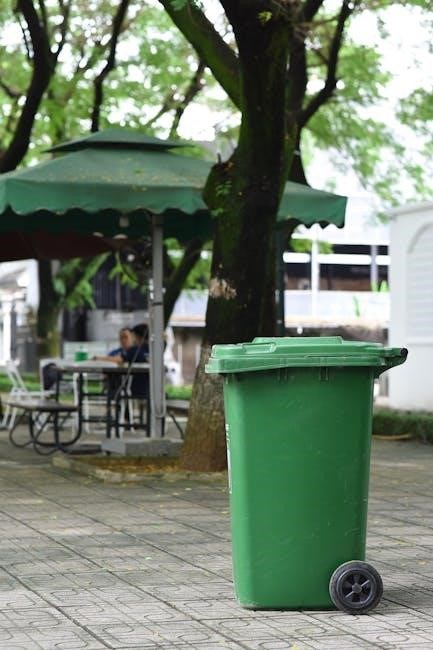
How to Download the 2023 Miami-Dade Recycling Schedule PDF
Visit the official Miami-Dade County Solid Waste Management website, navigate to the recycling section, and click the link to download the 2023 schedule PDF․
Step-by-Step Guide to Accessing the PDF
To access the 2023 Miami-Dade Recycling Schedule PDF, visit the official Miami-Dade County Solid Waste Management website․ Navigate to the recycling section and click on the “Recycling Schedule” tab․ Enter your address in the provided search tool to find your specific schedule․ Click the download link to save the PDF․ Additionally, residents can access the schedule through the county’s mobile app or by contacting customer service for assistance․ Ensure you have the latest version for accurate collection dates and guidelines․ This guide helps residents stay informed and participate effectively in the recycling program․ Regular updates are available online to reflect any schedule changes throughout the year․ Always verify the PDF’s publication date for the most current information․
Official Sources for the 2023 Recycling Schedule
The 2023 Miami-Dade Recycling Schedule is available through official county channels․ Visit the Miami-Dade County Solid Waste Management website for the most reliable information․ The official PDF can be downloaded directly from the site or accessed via the county’s mobile app․ Additionally, residents can contact Miami-Dade County’s customer service at 311 for assistance․ The county also provides an address search tool on its website to find specific schedules․ For updates or clarifications, residents are encouraged to rely on these official sources to ensure accuracy․ Using verified platforms helps avoid misinformation and ensures compliance with local recycling guidelines․ Always refer to the county’s official communications for the latest details on recycling schedules and services․
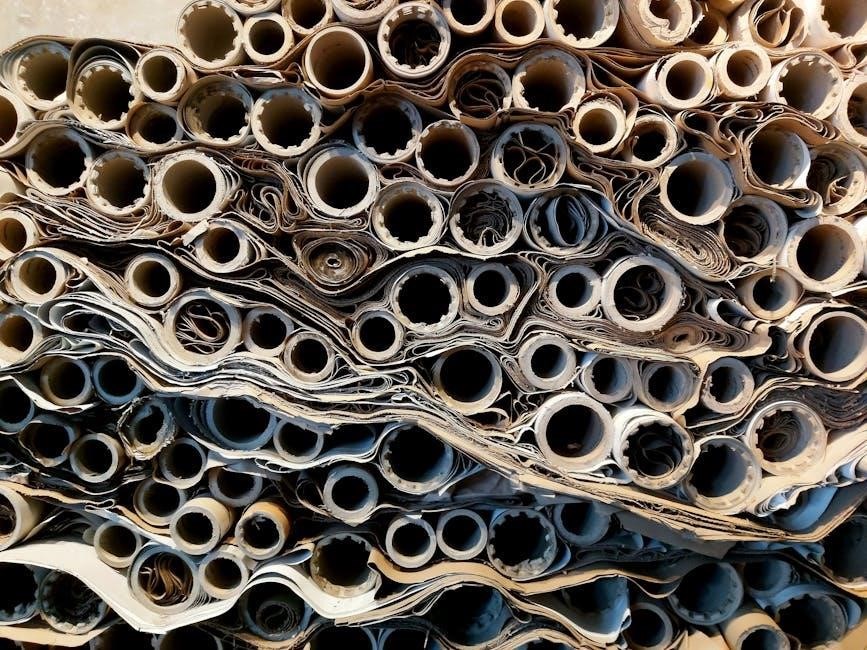
Understanding the Recycling Collection Schedule
The 2023 Miami-Dade Recycling Schedule outlines collection frequencies, with recyclables typically picked up every other week․ Use the address search tool to confirm your specific collection days․
Weekly and Bi-Weekly Collection Explained
The 2023 Miami-Dade Recycling Schedule differentiates between weekly and bi-weekly collections․ Trash collection occurs weekly, while recyclables are picked up every other week․ Residents can use the address search tool on the Miami-Dade County website to determine their specific collection days, ensuring they never miss a pickup․
For example, trash is collected on Mondays and Thursdays in some areas, while recycling is collected on Mondays and Thursdays but only every other week․ This system helps maintain efficiency and reduces waste management costs․ By adhering to the schedule, residents can contribute to a more sustainable community and ensure proper waste disposal․
How to Determine Your Collection Days
To determine your collection days, visit the Miami-Dade County Solid Waste Management website and use the address search tool․ Enter your address to view a personalized schedule, including trash, recycling, and bulky waste pickup dates․ Additionally, residents can download the official 2023 Miami-Dade Recycling Schedule PDF, which provides a detailed calendar․ The schedule varies by neighborhood, with some areas having trash collected twice weekly and recycling every other week․ Ensure accurate placement of waste on the correct days to maintain efficient service․ This resource helps residents stay informed and contributes to a smoother waste management process countywide․
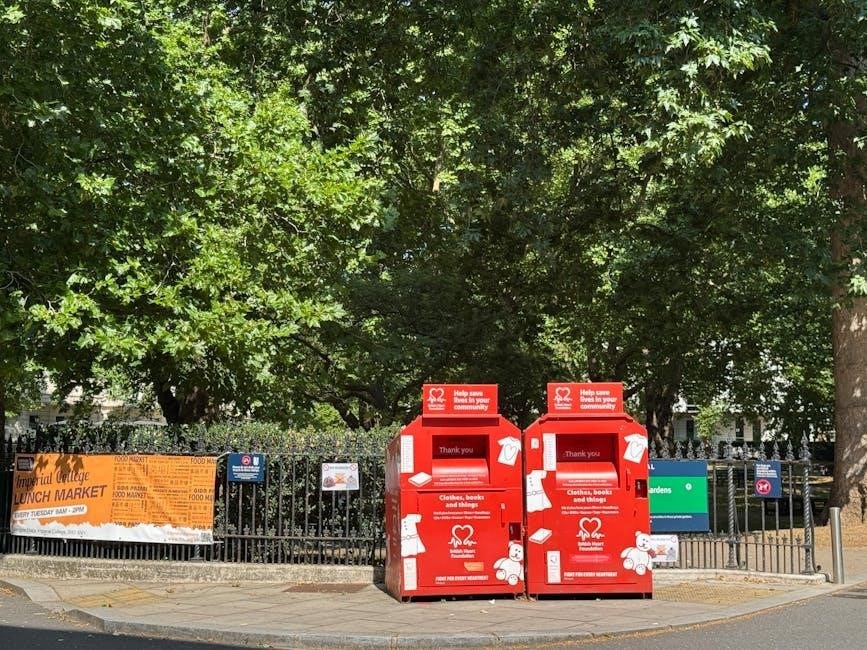
Holiday Adjustments in the 2023 Schedule
Major holidays alter recycling pickup dates in Miami-Dade County․ The 2023 schedule outlines specific changes, ensuring residents stay informed about adjusted collection days during holiday periods․
Impact of Major Holidays on Recycling Pickup
Major holidays significantly influence Miami-Dade County’s recycling pickup schedule․ Holidays like Independence Day, Thanksgiving, and Christmas often delay collection services, shifting pickup days to the following week․ Residents must check the official 2023 schedule to confirm changes, as dates vary by location․ For instance, if a holiday falls on a Monday, recycling pickup might occur on Tuesday instead․ This adjustment ensures continuity in waste management while accommodating holiday closures․ The county updates its calendar annually to reflect these changes, helping residents stay informed․ Missing a pickup due to a holiday means waiting for the next scheduled collection day․ Proper planning and awareness are essential for maintaining recycling consistency․
Special Instructions for Holiday Weeks
During holiday weeks, residents must adhere to specific guidelines to ensure smooth recycling services․ If a holiday falls on a typical collection day, services may be postponed or rescheduled․ It’s crucial to confirm the revised dates in the 2023 Miami-Dade Recycling Schedule․ Residents are advised to place bins at the curb by 7:00 AM on the designated day to avoid missed pickups․ Additionally, certain holidays may affect bulky waste or hazardous material collections, requiring separate arrangements․ The county recommends checking the official schedule or using the address lookup tool for precise details․ Proper preparation and awareness of these adjustments help maintain efficient recycling operations during holiday periods․

Accepted Materials for Curbside Recycling
Miami-Dade County accepts paper, plastic bottles, glass, and metal cans in curbside recycling․ Properly rinse items, remove lids, and flatten cardboard before placing them in bins․
Full List of Recyclable Items in 2023
Miami-Dade County’s 2023 recycling program accepts paper, plastic bottles, glass containers, metal cans, cardboard, and cartons․ Residents can recycle newspapers, junk mail, cardboard boxes, and paperboard․ Plastic items include bottles, jugs, and containers labeled #1 and #2․ Glass bottles and jars are also accepted․ Metal cans, such as aluminum and steel, are recyclable․ Flatten cardboard and cartons before placing them in bins․ Items like pizza boxes, soiled paper, and plastic bags are not accepted․ Always rinse containers and remove lids․ Visit the official Miami-Dade County website for the most accurate and updated list of recyclable items to ensure proper participation in the program․ Proper preparation helps reduce contamination and improves recycling efficiency․
Proper Preparation of Recyclables
Proper preparation of recyclables is crucial for efficient processing․ Residents should rinse food and liquid residues from containers and remove lids, caps, and labels․ Flatten cardboard and cartons to save space․ Place items loosely in the bin—no plastic bags or tying․ Avoid contamination by keeping items clean and dry․ Metal and glass should be separated from paper and plastic․ Do not include shredded paper, tissues, or broken glass․ Check the county’s accepted materials list to ensure compliance․ Properly prepared recyclables help reduce contamination rates and improve the effectiveness of Miami-Dade’s recycling program․ Always follow guidelines to make a positive environmental impact․
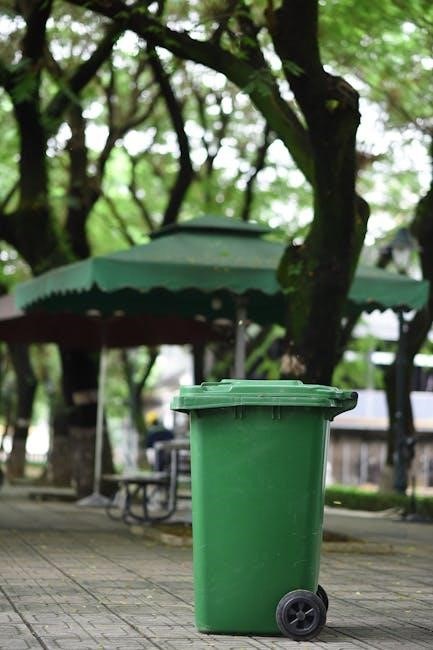
Special Collection Services
Miami-Dade offers special collection services for bulky waste and household hazardous waste, ensuring safe and efficient disposal․ Residents can schedule pickups and follow specific guidelines for accepted items․
Bulky Waste Pickup Guidelines
Miami-Dade County residents can schedule bulky waste pickups twice annually․ Items like furniture, appliances, and large household goods are accepted․ Residents must place items curbside by 7:00 AM on the scheduled day․ Metals, tires, and hazardous materials are excluded․ Use the county’s online system or call 311 to arrange pickups․ Separate bulky waste from regular trash and recyclables to ensure proper collection․ Proper preparation, such as dismantling large items, is required․ For more details, refer to the official bulky waste guidelines in the 2023 Miami-Dade Recycling Schedule PDF․ This service helps maintain community cleanliness and sustainability․
Household Hazardous Waste Disposal
Household hazardous waste, such as batteries, electronics, and chemicals, requires special disposal to protect the environment․ Miami-Dade County provides designated drop-off locations for these items․ Residents can visit one of the 13 Neighborhood Trash and Recycling Centers to safely dispose of hazardous materials․ Acceptable items include fluorescent bulbs, tires, and home chemicals․ Improper disposal can contaminate waterways and harm ecosystems․ Check the 2023 Miami-Dade Recycling Schedule for specific guidelines and collection events․ Properly managing hazardous waste is essential for maintaining a sustainable and healthy community․
The Economic Impact of Recycling in Miami-Dade County
Recycling in Miami-Dade County saves costs by reducing landfill use and generates jobs in recycling facilities, benefiting the local economy and promoting sustainable practices․
Cost Savings from Recycling Programs
Recycling programs in Miami-Dade County significantly reduce landfill costs, saving millions annually․ By diverting recyclables from landfills, the county avoids disposal fees and extends landfill lifespans․ Additionally, recycling often costs less than landfilling, creating economic benefits․ These savings enable investments in community services and infrastructure․ For instance, every ton of recycled material saves approximately $50 in landfilling costs․ The program also generates revenue through the sale of recyclable materials, further offsetting expenses․ Overall, recycling contributes to a more sustainable and fiscally responsible waste management system, benefiting both residents and the environment․ These cost efficiencies highlight the importance of continued participation in recycling initiatives․
Job Creation in the Recycling Sector
Miami-Dade County’s recycling programs have created numerous job opportunities across various sectors․ From recycling facility workers to route drivers, the industry employs hundreds, contributing to local economic growth․ Additionally, recycling initiatives support jobs in related fields, such as manufacturing, where recycled materials are processed into new products․ The expansion of recycling services has further boosted employment, offering roles in education, outreach, and program management․ These positions not only provide stable income but also foster a sense of community involvement in sustainability efforts․ By investing in recycling infrastructure, Miami-Dade County continues to generate employment opportunities, strengthening both its economy and environmental commitment․
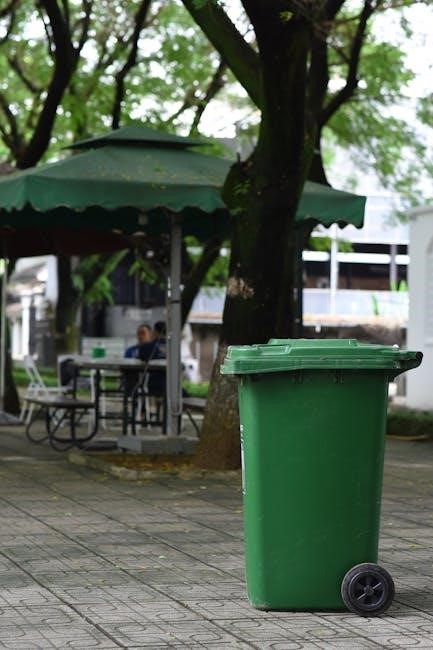
Environmental Benefits of Recycling
Recycling in Miami-Dade County significantly reduces greenhouse gas emissions, conserves natural resources, and minimizes landfill use, protecting ecosystems and promoting long-term environmental sustainability for future generations․
Reduction of Greenhouse Gas Emissions
Recycling plays a crucial role in reducing greenhouse gas emissions by minimizing the need for producing new materials, which requires significant energy and generates pollution․ By participating in Miami-Dade’s recycling programs, residents help lower carbon emissions associated with manufacturing processes․ Recycling materials like paper, plastic, and glass reduces the reliance on raw material extraction and processing, which are major contributors to greenhouse gases․ This effort aligns with the county’s broader sustainability goals, aiming to create a cleaner, healthier environment for future generations․ The 2023 recycling schedule ensures consistent and efficient collection, making it easier for residents to contribute to emissions reduction efforts countywide․ Recycling fosters a greener community and supports climate action initiatives․
Conservation of Natural Resources
Recycling significantly contributes to the conservation of natural resources by reducing the demand for raw material extraction and processing․ By reusing materials like paper, plastic, and glass, Miami-Dade residents help preserve forests, reduce mining activities, and lower water consumption․ The 2023 recycling schedule encourages participation by providing clear guidelines, making it easier for residents to recycle correctly․ Conserving resources not only protects ecosystems but also ensures their availability for future generations․ Through efficient recycling practices, the community plays a vital role in safeguarding natural habitats and promoting environmental health․ Recycling is a simple yet impactful way to make a difference in resource conservation efforts countywide․

Changes in the 2023 Recycling Schedule
The 2023 Miami-Dade Recycling Schedule introduced updated collection timelines, expanding service areas and adjusting pickup frequencies to enhance efficiency and resident convenience countywide․
Updates from Previous Years
- The 2023 Miami-Dade Recycling Schedule introduced a new collection calendar starting in March 2023, replacing earlier versions․
- Changes included updated pickup frequencies, with recycling now occurring every other week in most areas․
- Bulky waste collection guidelines were revised, allowing residents to schedule two pickups annually․
- Expanded service areas now cover additional neighborhoods, ensuring more residents can participate in curbside recycling․
- Holiday adjustments were refined to minimize disruptions, with clear instructions for observed holidays․
- The updated schedule also clarified acceptable materials, reducing contamination in the recycling stream․
- These changes aim to enhance efficiency, improve resident convenience, and align with long-term sustainability goals․
New Initiatives for 2023
In 2023, Miami-Dade County introduced several new initiatives to enhance recycling efficiency and community engagement․ A new collection calendar was launched, offering clearer guidelines for residents․ The county expanded its list of accepted recyclable materials, including additional types of plastics and paper products․ Educational campaigns were rolled out to reduce contamination rates in recyclables․ Residents also gained access to improved digital tools, such as an address-specific recycling schedule lookup and mobile app reminders․ Additionally, partnerships with local organizations were strengthened to promote recycling awareness․ These efforts aim to increase participation and make recycling more accessible and user-friendly for all residents․
Community Resources and Education
Miami-Dade County offers workshops, events, and educational materials to promote recycling awareness and proper practices, ensuring residents are well-informed and engaged in sustainability efforts․
Workshops and Events Promoting Recycling
Miami-Dade County hosts various workshops and events throughout the year to educate residents on proper recycling practices․ These events, often held in local community centers and libraries, provide hands-on learning opportunities․ Experts discuss topics like reducing contamination, preparing materials correctly, and understanding the recycling process․ Residents can also learn about new initiatives and updates to the recycling schedule․ Many events are free and open to the public, encouraging widespread participation․ Additionally, interactive sessions and Q&A forums allow residents to address specific concerns․ These efforts aim to foster a culture of sustainability and environmental responsibility within the community․ Regular updates on upcoming events are shared via social media and the county’s website․
Partnerships with Local Organizations
Miami-Dade County collaborates with local organizations to enhance recycling efforts and community engagement․ These partnerships include non-profits, schools, and businesses to promote sustainability․ For instance, the county works with environmental groups to organize community clean-up events and educational workshops․ Local schools integrate recycling education into their curricula, fostering awareness among students․ Additionally, partnerships with private sector entities help fund recycling initiatives and expand outreach programs․ These collaborations strengthen the county’s recycling infrastructure and encourage residents to participate actively․ By working together, Miami-Dade County and its partners aim to create a more sustainable and environmentally conscious community․ Such efforts are essential for achieving long-term recycling goals and reducing waste effectively․
Technological Tools for Recycling Management
Miami-Dade County utilizes online platforms, mobile apps, and digital calendars to streamline recycling management, enabling residents to track schedules, set reminders, and access resources efficiently․
Online Calendars and Reminders
Miami-Dade County offers interactive online calendars and reminder tools to help residents stay informed about their recycling schedules․ These digital resources allow users to input their address and receive personalized collection dates, ensuring they never miss a pickup․ Residents can also download the 2023 recycling calendar in PDF format for easy reference․ Additionally, mobile-friendly features enable users to set reminders for collection days, making recycling more convenient than ever․ These technological tools are accessible through the official Miami-Dade County Solid Waste Management website, providing residents with a seamless way to manage their recycling routine effectively and efficiently throughout the year․
Mobile Apps for Recycling Coordination
Miami-Dade County residents can utilize mobile apps to streamline their recycling efforts․ These apps provide personalized recycling schedules, collection reminders, and resources for proper waste disposal․ By downloading the official Miami-Dade recycling app, users can input their address to view specific pickup dates and access a comprehensive guide to recyclable materials․ Additionally, the app offers push notifications for holiday schedule changes and special collection events․ This convenient tool ensures residents stay informed and participate effectively in the county’s recycling program․ Links to download the app are available on the Miami-Dade Solid Waste Management website, making it easier than ever to coordinate recycling efforts on the go․

Common Mistakes to Avoid in Recycling
Contamination of recyclables and incorrect placement of waste are common errors․ Avoid mixing non-recyclable items like plastic bags and food waste with recyclables․
Improper sorting and failing to follow collection schedules can disrupt services․ Always check the accepted materials list and avoid overloading bins to ensure efficient recycling․
Contamination of Recyclables
Contamination occurs when non-recyclable items or improperly prepared materials are mixed with recyclables, disrupting the recycling process․ Food residue, liquids, and plastic bags are common contaminants that must be avoided․ Residents are urged to rinse containers and remove lids or caps before recycling․ Additionally, items like broken glass, ceramics, and Styrofoam are not accepted in curbside recycling and should be disposed of separately․ Contaminated materials may be rejected during collection, reducing the efficiency of recycling programs․ Proper preparation ensures materials are processed correctly, conserving resources and supporting sustainability goals․ Miami-Dade County emphasizes the importance of clean, sorted recyclables to maintain effective waste management․
Incorrect Placement of Waste
Incorrect placement of waste, such as mixing recyclables with trash or placing items outside the designated bins, can disrupt collection services․ Residents must ensure recyclables are placed in the correct bins and kept separate from regular waste․ Improperly placed items, such as bulky waste or hazardous materials, may not be collected and could lead to fines․ Additionally, placing recycling bins too close to other objects or overflowing bins can hinder collection efficiency․ Proper placement ensures materials are processed correctly, maintaining the effectiveness of Miami-Dade County’s recycling program and supporting environmental sustainability goals․ Always follow the guidelines provided in the 2023 schedule for accurate waste placement․
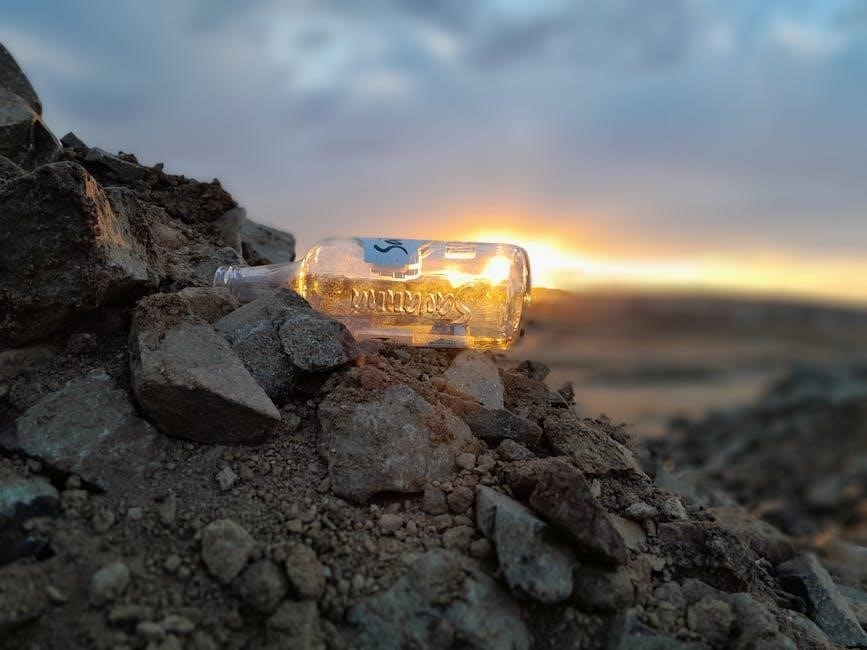
Contact Information and Support
For inquiries about the 2023 Miami-Dade Recycling Schedule, contact Solid Waste Management at 311 or visit Miami-Dade County’s official website․ Customer support is available to assist with recycling questions․
Miami-Dade County Solid Waste Management Contact Details
For questions about the 2023 recycling schedule, residents can contact Miami-Dade County Solid Waste Management at 311 or visit their official website at https://www․miamidade․gov/waste․ The department also provides contact information for specific services, including recycling and waste collection․ Office hours are typically Monday through Friday, 8:00 AM to 5:00 PM․ Residents can also reach out via email or phone for assistance with scheduling bulky waste pickups or resolving recycling-related issues․ Additionally, the department offers resources and forms for special requests on their website․ For general inquiries, call 305-514-9815 or visit their office located at 2377 NW 41st Street, Miami, FL 33142․
Customer Service for Recycling Inquiries
Miami-Dade County offers dedicated customer service for recycling inquiries․ Residents can call 311 for assistance with the 2023 recycling schedule, materials acceptance, and collection days․ Online support is available through the Solid Waste Management website, where users can submit questions or feedback․ Additionally, the department provides a contact form for specific concerns․ For non-emergency recycling issues, residents can email wastemanagement@miamidade․gov․ The customer service team is available Monday-Friday, 8:00 AM to 5:00 PM, to ensure all recycling-related questions are addressed promptly and effectively․ This service helps residents navigate the recycling process smoothly and efficiently․
Future of Recycling in Miami-Dade County
Miami-Dade County plans to expand recycling programs, improve infrastructure, and increase community engagement to enhance sustainability and meet long-term environmental goals effectively․
Planned Expansions and Improvements
Miami-Dade County aims to expand its recycling infrastructure, including new facilities for processing recyclables and adopting advanced technologies to improve efficiency․ Plans also include increasing public education campaigns to raise awareness about proper recycling practices․ The county intends to enhance its curbside collection services and explore partnerships with local organizations to boost participation․ Additionally, there are proposals to expand the list of accepted recyclable materials and improve the accessibility of recycling centers․ These initiatives are designed to address current challenges and create a more sustainable, efficient recycling system for future generations․
Long-Term Sustainability Goals
Miami-Dade County is committed to achieving long-term sustainability through enhanced recycling programs․ The county aims to increase recycling rates significantly by 2030, reducing landfill reliance and promoting eco-friendly practices․ Plans include expanding education initiatives to engage residents and businesses, ensuring broader participation․ Additionally, the county is exploring advanced recycling technologies to improve efficiency and reduce contamination․ By fostering partnerships with local organizations and investing in infrastructure, Miami-Dade aspires to create a model for sustainable waste management․ These efforts align with global environmental goals, ensuring a greener future for generations to come․ The focus is on building a resilient, resource-efficient community that prioritizes conservation and sustainability․